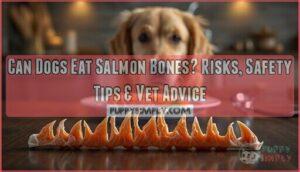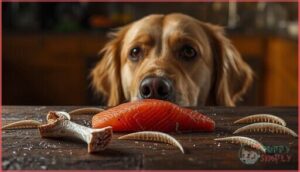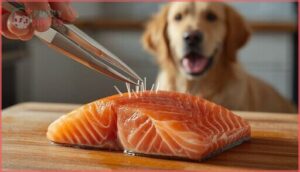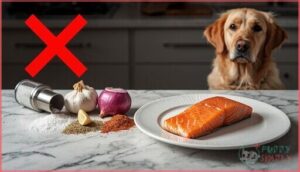This site is supported by our readers. We may earn a commission, at no cost to you, if you purchase through links.
Your dog’s begging eyes work their magic, and you’re tempted to toss them a leftover salmon bone from dinner. But those delicate, needle-thin bones aren’t the sturdy beef bones your dog might safely gnaw—they’re designed to splinter, and they do it with alarming ease.
Unlike the larger, denser bones from land animals, salmon bones are brittle enough to shatter into razor-sharp fragments that can pierce your dog’s mouth, throat, or digestive tract. The risks aren’t theoretical: veterinary emergency rooms regularly treat dogs with bone-related injuries, and salmon bones rank high on the danger list.
Understanding what makes these bones so hazardous—and knowing the safer alternatives—can spare you a terrifying late-night trip to the animal hospital.
Table Of Contents
- Key Takeaways
- Can Dogs Eat Salmon Bones Safely?
- Risks of Feeding Dogs Salmon Bones
- Nutritional Value of Salmon Bones for Dogs
- Safe Preparation of Salmon for Dogs
- Signs of Trouble After Eating Salmon Bones
- Healthier Alternatives to Salmon Bones
- Frequently Asked Questions (FAQs)
- What happens if my dog eats a salmon bone?
- Are salmon bones digestible?
- What parts of salmon can dogs eat?
- Can dogs eat boneless salmon?
- Is fresh salmon safe to eat?
- Can dogs eat raw salmon?
- Can dogs eat salmon heads?
- Can a dog eat fish with bones?
- Why do dogs eat salmon?
- What part of salmon can dogs not eat?
- Conclusion
Key Takeaways
- Salmon bones—whether raw or cooked—splinter into sharp fragments that can cause choking hazards, internal punctures, and life-threatening digestive tract injuries in dogs.
- Cooked salmon bones are especially dangerous because heat makes them brittle and glass-like, while raw bones carry additional risks of bacterial infections and salmon poisoning disease from parasites.
- Boneless cooked salmon provides all the nutritional benefits (omega-3s, protein, calcium) without any of the physical dangers, making it the only safe way to feed salmon to your dog.
- If your dog swallows a salmon bone, watch for immediate warning signs like choking, gagging, vomiting, bloody stools, or abdominal pain, and contact your veterinarian right away since complications can be life-threatening.
Can Dogs Eat Salmon Bones Safely?
The short answer is no—salmon bones aren’t safe for your dog to eat. These thin, sharp bones splinter easily and can cause serious harm, from choking to internal injuries.
Like salmon bones, cooked beef rib bones are equally dangerous because they splinter into sharp pieces that can injure your dog’s mouth, throat, or digestive tract.
Let’s break down exactly why salmon bones pose such a risk and whether any form of them might be safer than others.
Are Salmon Bones Dangerous for Dogs?
Yes, salmon bones pose serious dog nutrition risks. These small, brittle structures can snap into sharp fragments that cut your dog’s mouth or lodge between teeth.
Even worse, swallowed bones create choking hazards and can puncture the throat, stomach, or intestines—turning what seems like a harmless fish treat into a pet emergency. The dangers clearly outweigh any benefit to canine health.
Swallowed salmon bones can puncture your dog’s throat, stomach, or intestines, turning a simple treat into a life-threatening emergency
For more information on proper ways to include high-quality protein sources in your dog’s diet, consider guidelines from nutrition experts.
Differences Between Cooked and Raw Salmon Bones
Cooking methods make all the difference. Raw salmon bones stay somewhat flexible because they hold moisture, while heat turns them brittle—like glass—creating sharp, splintery fragments when your dog bites down.
Here’s what changes:
- Bone texture shifts from bendable to rigid after baking or grilling
- Digestive safety improves slightly with raw bones that crumble more easily
- Choking hazards increase dramatically with cooked salmon bones that snap into needle-like shards
- Nutrient retention stays higher in raw feeding, though parasites remain a serious concern
Neither option is truly safe. Fish offers omega-3 health benefits for dogs, but always consider bone and preparation risks before feeding.
Are Any Salmon Bones Safe for Dogs to Eat?
Most veterinarians say no salmon bones should be considered safe routine treats for dogs. Even when bones look soft or appear harmless, they can still splinter under pressure and create jagged edges that cut tissue.
Commercial dog foods use finely ground bone meal processed to meet safety standards, but whole or chunked bones—cooked or raw—pose choking hazards and digestive risks your dog doesn’t need.
Risks of Feeding Dogs Salmon Bones
Salmon bones may seem like a natural treat, but they pose serious threats to your dog’s health.
These thin, brittle bones can splinter easily and create dangerous situations from the moment your dog takes a bite.
Let’s look at the three main risks you need to understand before considering salmon bones for your pet.
Choking Hazards and Blockages
Salmon bones act like tiny needles inside your dog’s body, creating serious swallowing hazards and choking risks the moment they’re gulped down. These thin fragments pose multiple dangers:
Large breed puppies are especially vulnerable since their bodies struggle to process the extra calcium from bone fragments, which can disrupt healthy bone development and proper calcium balance.
- Airway obstruction occurs when bone shards lodge in the throat, blocking breathing completely in small breeds and puppies.
- Esophageal damage happens as sharp pieces stick in the swallowing tube, causing painful gagging and retching.
- Bone fragmentation during chewing creates jagged splinters that easily catch in narrow passages.
- Gastrointestinal risks emerge when swallowed bones travel deeper, creating blockages that trap gas and require emergency surgery.
Even dogs that eat slowly can experience these pet food safety emergencies, making salmon bones incompatible with safe canine dental care and dog health and nutrition practices.
Internal Injuries and Perforations
Sharp fragments pierce your dog’s digestive tract, turning a simple meal into a medical emergency. Fish bones that travel beyond choking hazards create devastating internal injuries.
| Injury Type | Consequences |
|---|---|
| Esophageal Risk | Painful swallowing, drooling, regurgitation |
| Gut Damage | Scratched intestinal lining, inflammation |
| Perforation | Bacterial leakage, life-threatening infection |
| Peritonitis | Abdominal pain, fever, emergency surgery |
| Internal Bleeding | Weakness, pale gums, collapse |
Boneless salmon eliminates these surgical nightmares entirely.
Bacterial Infections and Parasites
Hidden dangers lurk beyond physical trauma when your dog consumes raw salmon bones. The bacterium Neorickettsia helminthoeca carried inside intestinal flukes causes salmon poisoning disease, mainly in Pacific Northwest regions.
Salmonella, Listeria, E. coli, and Campylobacter contaminate raw fish surfaces, triggering vomiting, diarrhea, and fever. Proper cooking kills parasites and bacteria, making infection prevention and parasite control essential for fish safety and disease transmission avoidance.
Nutritional Value of Salmon Bones for Dogs
Salmon bones do contain valuable nutrients like calcium and omega-3 fatty acids that support your dog’s health. These minerals and healthy fats offer real benefits for bone strength, joint function, and inflammation control.
However, the question isn’t whether salmon bones have nutritional value—it’s whether those benefits justify the serious physical risks they pose.
Calcium and Mineral Content
If you’re thinking about fish bones as calcium sources, here’s what actually matters. A three-ounce serving of canned salmon with bones can deliver around 170 to 210 milligrams of calcium—nearly 20 percent of a medium dog’s daily need.
That said, here’s the mineral balance picture:
- Salmon bones contain 16 to 26 percent calcium by dry weight
- Phosphorus comes packaged with calcium in the bone matrix
- Magnesium, zinc, and iron appear in trace amounts
- Nutrient absorption from fish bones reaches about 22 percent in studies
Commercial dog foods already meet bone health requirements, so adding salmon bones risks overshooting safe calcium levels.
Omega-3 Fatty Acids and Joint Health
While Salmon Bones themselves pose serious risks, the omega3 fatty acids in salmon flesh offer genuine Joint Health advantages. Research shows about 75 to 100 milligrams of EPA and DHA per kilogram daily aids Canine Arthritis through Inflammation Reduction and improved cartilage cushioning.
These Fatty Acid Benefits boost mobility and ease Joint Pain Relief—but you’ll get better Nutritional Benefits from boneless portions than dangerous bones.
Do Benefits Outweigh The Risks?
When you weigh Risk Assessment against reality, Salmon Bones as Treats fall short. Major veterinary sources consistently recommend removing all bones because Choking Hazards and perforations create life-threatening emergencies that far exceed any mineral gain.
Your dog’s Nutritional Benefits and Health Outcomes improve dramatically with Boneless Alternatives that deliver omega-3s and protein without danger:
- Deboned cooked salmon provides complete Nutrient Balance and Dietary Safety
- Commercial fish treats offer controlled portions designed for Dog Health Benefits
- Balanced dog foods already supply calcium without physical risks
Safe Preparation of Salmon for Dogs
If you want to share salmon with your dog, proper preparation is everything. The right cooking method keeps your pup safe, while the wrong one can turn a healthy treat into a trip to the vet.
Here’s how to prepare salmon that’s both nutritious and safe for your four-legged friend.
Removing Bones Before Cooking
Removing bones before cooking is the safest fish safety guideline you can follow. Run your fingers along the fillet to locate pin bones, then use fish bone removal tools like tweezers or small pliers.
Pull each bone in the direction it naturally points to avoid breaking it. This deboning technique eliminates choking hazards and ensures your dog enjoys boneless salmon without risk.
Best Cooking Methods for Safety
Once you’ve removed the bones, baking salmon at 350 to 375 degrees Fahrenheit until it flakes easily is your safest bet.
Poaching in plain water or boiling for about eight minutes also brings the fish to 145 degrees, the magic number for food safety.
Grilling works too if you monitor closely—just skip the oil. These cooking times and baking techniques preserve dog nutrition while ensuring safe fish consumption without harmful bacteria.
Avoiding Seasonings and Harmful Additives
Salt, garlic, and onions are toxic ingredients that ruin healthy alternatives for your dog. A small dog can reach harmful additive levels with under a teaspoon of salt, while garlic powder in spice mixes damages red blood cells.
Skip all seasonings—even “dog friendly” labels may hide xylitol in glazes. Plain cooked salmon without bones ensures safe fish consumption and protects dog nutrition during raw feeding or meal prep.
Signs of Trouble After Eating Salmon Bones
If your dog swallows a salmon bone, you need to watch for warning signs that something’s gone wrong.
Some symptoms show up right away, while others may not appear until hours or even days later. Here’s what to look for so you can act quickly if your dog needs help.
Symptoms of Choking or Obstruction
Your dog may show breathing difficulties like loud, harsh sounds or rapid shallow breaths if a salmon bone blocks the airway. Watch for visible distress—pawing at the mouth, wide eyes, or frantic pacing.
Coughing fits, gagging, and repeated retching are common warning signs. Color changes in the gums (pale, gray, or blue) and swallowing issues like excessive drooling signal serious trouble requiring immediate veterinary care.
Signs of Digestive Injury or Illness
Beyond choking, salmon bones can trigger serious digestive problems inside your dog’s body. Abdominal issues like a tight, painful belly or hunched posture often appear within hours to days. Watch for vomiting causes including repeated nausea, blood-streaked vomit, or stool changes—watery diarrhea, black tarry stools, or bright red blood. Fever signs, lethargy, and loss of appetite point to salmon poisoning disease or infection needing immediate care.
| Warning Sign | What to Watch For | Urgency Level |
|---|---|---|
| Abdominal pain | Tight belly, hunched back, crying when touched | High |
| Vomiting or diarrhea | Blood streaks, coffee-ground material, bone fragments | Emergency |
| Fever and weakness | Temperature above 103°F, shaking, discharge | Emergency |
| Stool abnormalities | Black tarry stools, bright red blood, straining | High |
When to Contact a Veterinarian
Call your vet immediately if your dog shows Emergency Symptoms like choking, repeated vomiting, or breathing trouble after eating Salmon Bones.
Urgent Care becomes critical when you notice:
- Collapse, extreme weakness, or pale gums indicating internal bleeding
- Continuous gagging, pawing at the mouth, or airway obstruction
- Swollen, painful abdomen or inability to pass stool suggesting Digestive Issues
- Fever, bloody diarrhea, or lethargy pointing to Salmon Poisoning Disease
- Any severe discomfort lasting beyond 12 hours
Early Veterinary Advice prevents life-threatening complications.
Healthier Alternatives to Salmon Bones
You don’t need to put your dog at risk with salmon bones when plenty of safer options deliver the same nutritional benefits.
From boneless fish to specially formulated treats, you can give your dog high-quality protein and omega-3s without the hazards.
Here are three smart alternatives that keep your pet safe while supporting their health.
Boneless Cooked Salmon as a Protein Source
When you strip away the danger of salmon bones, boneless cooked salmon becomes a powerhouse protein source for your dog. A three-ounce serving delivers complete amino acids, omega-3 benefits for skin and joints, plus vitamin contribution without carbohydrates.
Here’s how portion guidelines keep it safe:
| Dog Size | Weekly Portion | Protein Quality Benefits |
|---|---|---|
| Extra Small (2-20 lbs) | 1-2 ounces | Concentrated amino acids for muscle repair |
| Small (21-30 lbs) | 2-3 ounces | Easy-to-digest complete protein |
| Medium (31-50 lbs) | 3-4 ounces | Aids tissue health without excess fat |
| Large (51-90 lbs) | 4-6 ounces | Boosts protein intake efficiently |
Bake, steam, or grill plain salmon until opaque—no seasonings, no oil. This preparation method preserves omega-3 fatty acids while eliminating choking risks entirely. You’re giving your dog nutrition and health assistance without gambling on sharp fragments.
Commercial Fish-Based Dog Treats
Manufactured fish treats remove the gamble of salmon bones while keeping omega-3 benefits intact. Reputable brands air-dry or bake whole fish into safe, crunchy snacks that satisfy dog nutrition and health goals without raw feeding risks.
- Deboned fillets eliminate sharp fragments yet preserve fish ingredient sourcing quality.
- Fish oil supplements embedded in treats boost nutrient retention during dog treat manufacturing.
- Pet food regulations require guaranteed analysis panels, so you see protein and omega-3 levels clearly.
- Natural treats made from wild-caught salmon deliver flavor without artificial fillers or fish bones hazards.
Consulting Your Vet for Safe Treat Options
Your vet brings insider knowledge of your dog’s health history, breed quirks, and appetite patterns—making them the go-to expert for tailoring safe treats. They’ll calculate portion limits, check labels for hidden allergens, and recommend fish-based snacks that match any prescription diet.
Regular vet consultations keep treat choices aligned with pet wellness goals, steering you away from salmon bones and toward products that support dog nutrition without emergency-room drama.
Frequently Asked Questions (FAQs)
What happens if my dog eats a salmon bone?
If your dog swallows a salmon bone, check their mouth for visible pieces and monitor closely for choking, gagging, or difficulty breathing—then contact your veterinarian immediately for emergency guidance.
Are salmon bones digestible?
Technically yes—salmon bones contain calcium and phosphorus that stomach acid can break down over time.
However, they often splinter or lodge in the throat or intestines before fully digesting, creating serious canine health risks.
What parts of salmon can dogs eat?
Think of salmon like a treasure chest—the real prize is inside.
Your dog can safely enjoy boneless meat and cooked skin, while bones, raw flesh, and scales remain off-limits for dog nutrition.
Can dogs eat boneless salmon?
Yes, you can feed your dog boneless salmon—it delivers omega-3s, quality protein, and promotes skin health—but it must be fully cooked, plain, and checked carefully for any hidden stray bones.
Is fresh salmon safe to eat?
Fresh salmon, like a health insurance policy for your plate, is safe to eat when cooked to 145°F. This temperature kills parasites and bacteria.
Properly refrigerated salmon keeps for two days and provides omega-3s and protein.
Can dogs eat raw salmon?
No, dogs shouldn’t eat raw salmon. Raw fish risks salmon poisoning disease from parasites carrying dangerous bacteria, especially in Pacific Northwest regions.
Thorough cooking eliminates these threats, making cooked salmon the only safe choice for canine health.
Can dogs eat salmon heads?
A whole salmon head—complete with gills, cartilage, and dozens of tiny bones—presents more risk than reward for most dogs, even when thoroughly cooked and deboned as much as possible.
Can a dog eat fish with bones?
Most fish bones pose serious hazards to dogs due to their sharp edges and splintering risk.
Safe feeding practices require removing all bones before serving any fish, prioritizing boneless diet options and pet nutrition guidelines for ideal dog health.
Why do dogs eat salmon?
That savory smell from your kitchen? It’s triggering your dog’s instincts.
Dogs eat salmon because the fishy smell appeals to their scavenging nature, while the protein drive and canine preferences for rich fats make it irresistible.
What part of salmon can dogs not eat?
You should never feed your dog raw flesh, salmon bones, sharp fins, fish heads, or heavily seasoned salmon skin—all pose serious choking risks and injury risks that threaten your pet’s safety.
Conclusion
Salmon offers dogs powerful nutrition, yet its bones pose serious dangers—a paradox that’s easy to resolve. The answer to “can dogs eat salmon bones” is clear: skip the bones entirely and serve properly prepared, boneless salmon instead.
Your dog gets the omega-3s, protein, and flavor they crave without the emergency-room risks. When you prioritize safe preparation over convenience, you’re not withholding a treat—you’re protecting your companion from preventable harm.
- https://www.akc.org/expert-advice/nutrition/can-dogs-eat-salmon/
- https://nextgenpet.com/salmon-dog-bones/
- https://www.adn.com/outdoors/article/without-salmon-feed-there-might-be-very-few-alaskan-huskies/2015/08/27/
- https://caninearthritis.org/article/overview-of-omega-3-fatty-acids-for-oa/
- https://vcahospitals.com/know-your-pet/salmon-poisoning















